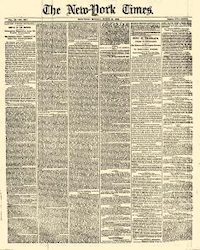The New York Times, May 17, 1860
Special Dispatch to the New-York Times.
CHICAGO, Thursday, May 17.
The Convention has made decided progress today. It has acted upon the credentials of members; designated the vote which each State shall have; adopted rules and an order of business, and laid down the platform of the party. The details of all these movements will reach you by telegraph to the Associated Press.
There were symptoms of a storm in the morning. The first signal was Mr. WILMOT’s protest against delegates from Southern States being allowed to vote. There had been a general understanding that most of them would vote for Mr. SEWARD, and Mr. WILMOT’s Movement was regarded as an attempt to diminish Mr. SEWARD’s strength. Several Southern delegates made a warm remonstrance against it, and one or two of them gave Pennsylvania some severe hits.
Mr. ARMOUR, of Maryland, repelled the intimation that Northern money might be used hereafter to influence Southern votes, and saying that the Republicans of Maryland were unpurchased and unpurchasable, and added that Pennsylvania might put that in her pipe and smoke it. Mr. BLAKELY of Kentucky said that he was in the Convention of 1856, and voted for Judge WILMOT, for President, and did not see why Mr. WILMOT now proposed to disfranchise him. After along debate, the report of the Committee was sent back with the assent of the Southern delegates, and during the afternoon a new one was made in which they were allowed a modified vote according to the districts actually represented.
This storm then subsiding, another grew out of a very unfair attempt to impose a two-thirds rule upon the Convention. The Committee reported in favor of requiring a majority of all electoral votes in the whole Union to effect a nomination. This was the work of ELI THAYER, who carried the point by a majority of one, at a meeting of the Committee where only 17 out of 27 members were present. The report was read with loud protests, and a minority report made by Judge JAMES, of New-York, requiring only a majority vote, was adopted in its stead.
This ended the formal business. The platform, which you will get in full, was read amid the most unbounded applause. The clause about naturalization aroused the indignation of the Massachusetts delegation, who protest against it in the strongest terms. Mr. GIDDINGS was for a time greatly aggrieved by the rejection of his amendment, but it was afterwards incorporated in another form, and his equanimity was restored.
The general feeling of the Convention is decidedly conservative, and opposed to everything like interference with Slavery in States where it exists. The declaration against invasion of States and Territories was received with loud applause.
The only thing now remaining is the nomination, and that will be effected to-morrow, probably, after 10 or 12 ballots. It is impossible to predict the result with any certainty, but Mr. SEWARD’s prospects are just now decidedly good. His opponents will find it impossible to unite on any candidate, and the general impression is that his nomination is simply a matter of necessity. The supporters of Mr. BATES have abandoned the field, and most of them will at once declare for Mr. SEWARD.
The only man upon whom there is any hope of uniting is Mr. LINCOLN, and very little progress is made in the effort. The prospect is, that when the several States find that they cannot carry their own candidate, they will fall back upon Mr. SEWARD. To this rule there will be exceptions. Part of the Pennsylvania delegation are very bitter in their opposition, and the naturalization clause in the platform has infused something of the same feeling in the delegates from Massachusetts and Connecticut.
The tariff clause gives universal satisfaction, and was received with a storm of enthusiasm seldom witnessed in any popular gathering.
The Vermont delegation is divided, and for the present more hostile to Mr. SEWARD than had been anticipated.
It would be impossible to give an adequate idea of the intense excitement pervading the city. A mass-meeting of those unable to obtain entrance to the Wigwam is held outside. Mayor WENTWORTH has been speaking this evening. Gen. NYE and Gov. CORWIN spoke to-night to ten thousand people at the Wigwam.
The Massachusetts delegation has adjourned after a stormy session. They say the insult offered the State by the 14th clause can only be wiped out by the nomination of BANKS or WADE, and the American Republicans declaim loudly against the submission of the Convention to the demands of the German leaders, and say it will cost them Connecticut and Rhode Island.
Pennsylvania, New-Jersey, Indiana, Illinois, Maryland, Missouri, Virginia and Kentucky, had an informal meeting this evening, and unsuccessfully attempted to harmonize the friends of LINCOLN, CAMIRON and BATES.
The friends of Mr. BATES, not here, will be astounded at an announcement to be made to-morrow.
Mr. WEED is confident of success, and with apparent reason.
HOWARD.
